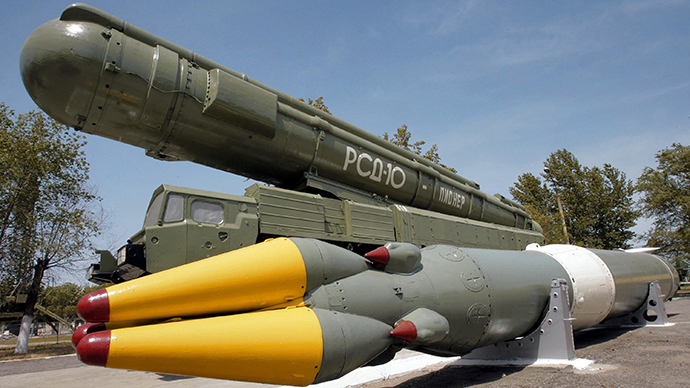
The medium-range RSD-10 Pioneer (SS-20) missile system (RIA Novosti / Anton Denisov) / RIA Novosti
The United States recently test fired an Anti-Ballistic Missile (ABM) system that intercepted and destroyed its intercontinental ballistic missile (ICBM) target successfully.
The capability to destroy ICBMs had been the last major technological challenge since the Cold War. While this system seems successful at this stage, intercepting multiple ICBMs or one with multiple warheads still looks out of reach. Moscow has been surrounded by a ring of ABMs for some time; their effectiveness has never had to be tested since their deployment.
The strategy that prevented the exchange of ICBMs between the United States and the Soviet Union for decades was a slow progression of communications, dialogue and treaties that reduced the stockpile of nuclear arms. This dialogue also enabled the United States and the Soviet Union to humanize each other and tamp down on propaganda intended to solidify and embolden each side to fight to the last person.
This did not mean that a country’s resolve was reduced. Dialogue was taken from a position of strength, but also used the confidence each country’s population had in their resolve to come to a meeting of minds. With confidence came respect, and the Cold War fizzled away within the next generation.
As an ABM system can physically show the willingness of a country to defend itself, the perception of strength must also be present in order for a dialogue to be successful. The perception that a country can be disabled, obstructed or even controlled by a foreign power makes it seem that any actions in relation to their adversary will result in harm or oppression.
When it becomes possible to see adversaries as less human, it creates an environment of reactionary strategy, something the cold warriors were keen to measure, control and completely avoid. The perception of self-weakness and the feral reaction to achieve security can be more dangerous than many of the weapons systems themselves.
The reality is that the United States is able to defend the country from military and cyber threats, and has the capability to retaliate in if it is targeted, and most likely has in many cases.
The United States is not weak in this regard, and news coverage of anything to do with Russia seems to lack the perception of humanity in relating to a relatively strong adversary. The worst case scenario of a lack of introspective reporting on issue surrounding Russia could lead to a hot conflict, or a bias against Russians and Russian speaking people living in Western countries.
While it most likely will not lead to an exchange of ICBMs, the value of having an open dialogue even with an adversary has proven to be of value, and limiting the ability to re-establish a method of deterrence through communication is ignoring past successes for the sake of little gain.
Humanizing an adversary, even those who seek to cause harm is of more value than the best ABM system. A fictional show like The Americans may be more useful than many news reports in understanding how to approach adversaries in different ways, not for the sake of information, but in opening a communication channel and avoiding the kind of mistakes that could have have turned the Cold War hot. Misunderstandings and actions that promote a feral response to defense are extremely dangerous with any adversary.